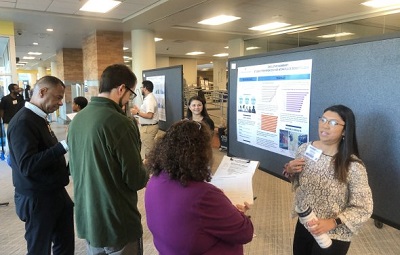Description/Abstract/Artist Statement
Reef-building corals host symbiotic algae known as zooxanthellae living within their tissues. Exposure to prolonged elevated temperature can cause corals to expel their symbionts and lead to coral bleaching. In this study, corals from Florida and Belize inshore reefs (high temperature variability) and offshore reefs (low temperature variability) were subjected to a 6-week-long heat stress experiment to determine if inshore corals displayed higher stress tolerance than offshore samples. Measurements of calcification rates suggested that Belize’s inshore or “BackReef” corals demonstrated the greatest growth and stress tolerance. Ongoing symbiont density measurements will provide further clues to stress tolerance.
Presentation Type
Event
Disciplines
Biology
Location
Learning Commons @ Perry Library, Conference Room 1310
Start Date
2-13-2016 10:15 AM
End Date
2-13-2016 11:15 AM
Upload File
wf_yes
Included in
Calcification Rates Indicate Thermal Stress Tolerance in Belize “BackReef” Corals
Learning Commons @ Perry Library, Conference Room 1310
Reef-building corals host symbiotic algae known as zooxanthellae living within their tissues. Exposure to prolonged elevated temperature can cause corals to expel their symbionts and lead to coral bleaching. In this study, corals from Florida and Belize inshore reefs (high temperature variability) and offshore reefs (low temperature variability) were subjected to a 6-week-long heat stress experiment to determine if inshore corals displayed higher stress tolerance than offshore samples. Measurements of calcification rates suggested that Belize’s inshore or “BackReef” corals demonstrated the greatest growth and stress tolerance. Ongoing symbiont density measurements will provide further clues to stress tolerance.



Comments
Faculty Mentor: Dr. Dan Barshis